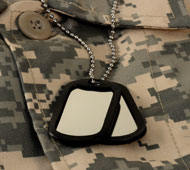More De-Escalation Tactics Training on the Way
 Many of the 2.4 million Americans who have fought in Iraq or Afghanistan are now coming home.1 Studies have reported estimates of 18 percent of Iraq and Afghanistan veterans having Post-Traumatic Stress Disorder (PTSD) and 20 percent returning with Traumatic Brain Injuries (TBI).2 Signs of distress and disorders such as PTSD often do not appear until after many months of post-deployment.3 “Law enforcement is often in the position of being a first responder to a veteran in crisis, requiring awareness of tactics, techniques, and procedures to properly deal with the situation.”4
Many of the 2.4 million Americans who have fought in Iraq or Afghanistan are now coming home.1 Studies have reported estimates of 18 percent of Iraq and Afghanistan veterans having Post-Traumatic Stress Disorder (PTSD) and 20 percent returning with Traumatic Brain Injuries (TBI).2 Signs of distress and disorders such as PTSD often do not appear until after many months of post-deployment.3 “Law enforcement is often in the position of being a first responder to a veteran in crisis, requiring awareness of tactics, techniques, and procedures to properly deal with the situation.”4
In FY2011, the COPS Office awarded funding to the Upper Midwest Community Policing Institute (UMCPI) to develop and deliver Public Safety De-Escalation Tactics for Veterans in Crisis training.5 Between 2011 and early 2013, UMCPI delivered 15 trainings throughout the United States.
 Approximately 550 representatives from state and local police departments, county sheriff’s offices, tribal police, port and harbor police, university and college police, airport police departments, emergency dispatchers, and other public safety agencies were trained on topics such as the reintegration challenges of returning veterans, wartime stressors, de-escalation tactics, and resources for veterans and their families. Classrooms were often at capacity and many requests for de-escalation tactics training went unmet due to the finite resources available.
Approximately 550 representatives from state and local police departments, county sheriff’s offices, tribal police, port and harbor police, university and college police, airport police departments, emergency dispatchers, and other public safety agencies were trained on topics such as the reintegration challenges of returning veterans, wartime stressors, de-escalation tactics, and resources for veterans and their families. Classrooms were often at capacity and many requests for de-escalation tactics training went unmet due to the finite resources available.
“I learned about the different issues facing returning vets, to be able to recognize the symptoms of post traumatic stress and ways to build rapport with the vet in crisis,” Matchinsky said. “I will definitely be more prepared to handle veterans in crisis, along with other people in crisis, after this training. I would recommend this training to all officers and first responders.”6 – stated Isanti County Deputy Dave Matchinsky, as reported to Rachel Kytonen of the Isanti County News.
 In response to the success of and demand for the training, the COPS Office awarded additional funding to UMCPI, under the FY2013 Community Policing Development program, to develop and deliver a Train-the-Trainer course. The Public Safety De-Escalation Tactics for Veterans in Crisis Train the Trainer (ToT) course will result in the creation of a cadre of experienced trainers around the United States in de-escalation tactics, exponentially leveraging federal funding and affording more public safety personnel the opportunity to benefit from this training. Learning these techniques will help personnel handle incidents involving military veterans in crisis more effectively, improving the safety of service members, officers, and their communities.
In response to the success of and demand for the training, the COPS Office awarded additional funding to UMCPI, under the FY2013 Community Policing Development program, to develop and deliver a Train-the-Trainer course. The Public Safety De-Escalation Tactics for Veterans in Crisis Train the Trainer (ToT) course will result in the creation of a cadre of experienced trainers around the United States in de-escalation tactics, exponentially leveraging federal funding and affording more public safety personnel the opportunity to benefit from this training. Learning these techniques will help personnel handle incidents involving military veterans in crisis more effectively, improving the safety of service members, officers, and their communities.
For more information on this training, visit www.umcpi.org or contact Training Services Director, Wayne Shellum at 651-917-2255. You can learn more about the training by listening to Wayne Shellum’s August 2012 podcast recorded for the COPS Office by visiting www.cops.usdoj.gov. UMCPI trainers William Micklus and John Baker will also be discussing this training during the Policing our Veterans, Policing our Heroes workshop held on October 20 at this year’s International Association of Chiefs of Police Annual Conference.
Debra R. Cohen McCullough, Ph.D.
Senior Analyst
COPS Office
1 “VA Medical Article Discusses Specialized Iraq and Afghanistan Veteran Health Care Needs,” (press release) U.S. Department of Veterans Affairs, June 12, 2012, www.va.gov/opa/pressrel/pressrelease.cfm?id=2327.
2 T. Teneilian, and L.H. Jaycox, eds. Invisible Wounds of War: psychological and Cognitive Injuries, their Consequences, and Services to Assist Recovery. (Santa Monica: RAND Center for Military Health Policy Research, 2008); Congressional Budget Office, “The Veterans Health Administration’s Treatment of PTSD and Traumatic Brain Injury Among Recent Combat Veterans,” February 2012, www.cbo.gov/sites/default/files/cbofiles/attachments/02-09-PTSD.pdf ; “PTSD in Service Members and New Veterans of the Iraq and Afghanistan Wars: A Bibliography and Critique,” National Center for Post Traumatic Stress Disorder, vol. 20, no. 1, winter 2009, www.ptsd.va.gov/professional/newsletters/research-quarterly/V20N1.pdf.
3 Barbara Webster. Combat Deployment and the Returning Police Officer. Institute for Law and Justice. (Washington, D.C.: Office of Community Oriented Policing Services, 2012), http://ric-zai-inc.com/Publications/cops-p150-pub.pdf.
4 UMCPI, Public Safety De-escalation Tactics for Military Veterans in Crisis, training participant guide, 2011.
5 Debra R. Cohen McCullough. “2012 COPS Conference Recap: Training to Address Veterans in Crisis Highlighted,” Community Policing Dispatch, vol. 5 Issue 9, September 2012, http://cops.usdoj.gov/html/dispatch/09-2012/TrainingToAddressVeterans.asp.
6 Rachel Kytonen, “Law enforcement learns de-escalation tactics for military veterans in crisis,” May 15, 2013. http://isanticountynews.com/2013/05/15/law-enforcement-learns-de-escalation-tactics-for-military-veterans-in-crisis/.
Lessons from a Hate Crime Detective | What Can HTCP Do For You? | Responding to Domestic Violence | More De-Escalation Tactics Training | Interoperability Guidebook Updated | COPS at IACP| Meet the Authors!

